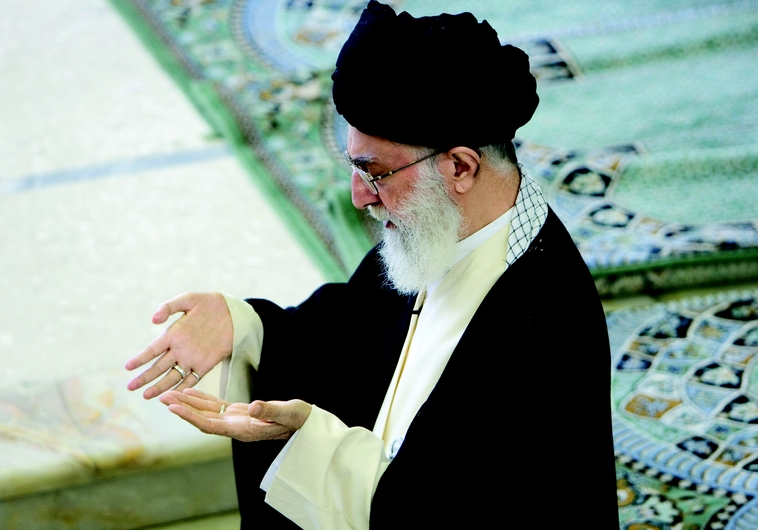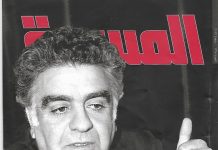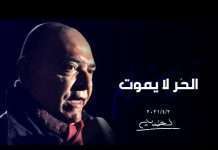Iran hardliners celebrate forthcoming years
Dr. Majid Rafizadeh/Al Arabiya/December 02/16
Iran’s Hardline newspapers and officials write and speak of good and advantageous years in the near future for the Islamic Republic due to fundamental and permanent changes in the regional and global order.
The final decision makers in Iran’s domestic and foreign policy- who are the hardliners, primarily the Supreme Leader Ayatollah Ali Khamenei and the senior cadre of Iran Revolutionary Guard Corps- argue that Iran’s expanding influence inevitable.
Syria, Iraq, Yemen, and Iran’s Shiite Proxies
The fate of the Alawite state and Bashar Al Assad is a matter of national security for Iranian leaders. Any change in the political system of Damascus will significantly alter the regional power of power. That is why Tehran has invested billions of dollars, resources and military forces to keep Assad in power. From the hardliner’s perspective, the West will not intervene militarily in Syria because the stakes are too high. Iran’s hardliners strongly believe that the West is more than willing to allow Russia and Tehran to handle the Syrian war.
In addition, although Iran is ranked the top sponsor of international terrorism, Iran’s hardliners believe that they have effectively sold the international community on the idea that Tehran is the single most important partner to fight ISIS, and that the West needs Iran to fight terrorism.
Any change in the political system of Damascus will significantly alter the regional power of power. That is why Tehran has invested billions of dollars, resources and military forces to keep Assad in power. On Iraq, Iran hardliners view their power to have effectively penetrated the security, military, political, and religious institutions.
When it comes to Iran’s proxies, Iran’s hardliners make certain that their increasing revenues ensure the survival of these proxies. Tehran is also giving birth to other Shiite militia groups and turning them in political realities which would make it impossible for other powers to counter Tehran’s increasing regional influence.
The Nuclear Deal
For hardliners, they have achieved their major objectives from the nuclear agreement. They argue that the four rounds of the UN Security Council Resolutions have been lifted and that the likelihood of snapping those sanctions back is zero because of Russia’s and China’s veto power.
They hold the belief that the increasing oil sales and trades with the West as irreversible. Iranian officials make the argument that the European countries are dependent on Iran’s oil and gas for decades to come because they would rather find other alternatives to Russia for energy supplies. Approximately 29 percent of Iran’s crude oil is being exported to European countries including Spain, Greece, and France. Hardliners believe that the export to European nations will definitely increase as Iran expands its output.
For Iran, the continuation of the extra revenue is critical and inevitable. Iran’s oil revenue has currently increased approximately 380 percent, in only a year after sanctions were lifted. This revenue is based on the current low prices of oil, and selling roughly 3.9 million a barrel a day, and trade with Asia and Europe (not the US). This means that, even at the current low oil prices, if Tehran reaches the goal of exporting 4.2 million barrel a day, Iran’s oil revenues will be around $50 billion a year, almost 450 percent of Iran’s oil revenue before sanctions were lifted. Hardliners see that the Islamic Republic will be receiving billions of dollars in additional revenue while other countries observe a decrease in their revenues.
Iran’s extra budget will be channeled to Iran’s Revolutionary Guard Corps (IRGC) and the Office of the Supreme Leader, Ayatollah Ali Khamenei, due to the fact that they enjoy the ownership of major oil and gas sectors and stocks in the Islamic Republic. This will significantly assist Iran’s allies- Bashar Al Assad and Shiite proxies- to shift the regional balance of power in favor of Iran. In other words, Iran believes that it will continue to achieve its geopolitical, strategic and regional hegemonic ambitions. As a result, from the hardliners’ perspective, any change in the nuclear deal is not going to affect their rising power.
IRGC
Iran hardliners argue that they are building more bases, ports and ships in Arab or Western countries, and that their military power has reached an unprecedented level. Major General Mohammad Hossein Baqeri said the deterrent of building more ships, ports and bases in foreign nations “could be ten times more efficient than nuclear power”. An Iranian flotilla was recently deployed to the Atlantic Ocean for the first time ever.
Iran’s military institutions appear to benefit from the continuing chaos and crises in the region. As Iran’s hardliners see their increasing power becoming unstoppable and as they view the upcoming years as bringing advantageous news, it remains to be seen whether the West and regional power will cooperate effectively and comprehensively in order to counter IRGC’s increasing power and influence in foreign nations.



















